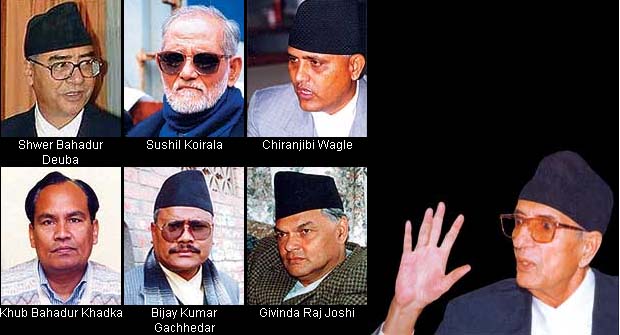
With the most laterally-mobile kangresi having made his latest move, some commotion in national politics was inevitable. After all that has happened in the last seven days, though, it would be tempting to dismiss Khum Bahadur Khadka's abandoning of Sher Bahadur Deuba's ship as an irrelevant ripple. The pertinent point the Nepali Congress (Democratic) ex-general secretary makes is that Nepali politics continues to be enlivened by empathy.
To be sure, without Khadka and his band of loyalists, Deuba's party would probably have been something akin to CP Mainali's Marxist-Leninist faction. The Baneshwor convention that ousted Girija Prasad Koirala as party president required much more than the resources Khadka could muster as Deuba's home minister. The challenge of reinventing the Nepali Congress demanded organisational skills that rivalled Koirala's.
In the larger scheme of things, Khadka's post-October Fourth plight marked the apotheosis of political accountability. The man who helped push tougher anti-corruption legislation through parliament became one of its first test cases. Symbolism, however, can provide limited succour in solitude. Those close to Khadka tell us his latest switch was inspired by the phone calls he received from Koirala. Deuba let it be known that his moral moorings wouldn't allow him to come out in defence of a tainted ally. When Khadka's release on bail became imminent, Deuba did begin to show some solidarity. The damage had been done.
In the current political context, it is perhaps irrelevant to recall how Deuba held his ground when the palace wanted him to sack some of his more sullied ministers. What's important here is that Koirala showed sympathy long before the kangresi-in-chief got his own summons from the anti-graft watchdog. And after all Khadka did to put Deuba in the prime minister's seat and Shailaja Acharya on the party president's.
With at least a quarter of kangresi MPs always in his pocket, Khadka's dexterity has determined the shape of post-1990 politics. From Krishna Prasad Bhattarai to Koirala and Deuba, premiers have staked their fate on the motions of this man. Once he helped you get the top job, he made you perpetually aware of your mortality. The UML top brass still seethes when it recalls the most prominent Kangresi face grinning behind the split that denied the comrades their majority government in 1999. With such power behind the throne, why would Khadka ever want to sit on it?
Deuba, too, has his set of human foibles. Although it didn't look so ominous two years ago, his troubles started even before he took the prime ministerial oath. For three days, the planetary position wasn't propitious for the swearing-in ceremony. For another two days, Deuba tried hard getting the political alignments right while drawing up his cabinet list. In between, aides to the prime minister-elect tried rearranging the furniture at his Singha Darbar office along directions they hoped would help prolong his tenure. In the end, Deuba decided to underpin the endurance of his government on a three-pronged formula: promises of phase-wise cabinet expansions to accommodate and pacify supporters, peace talks with the Maoists, and a "revolutionary" land-reform agenda.
In each initiative, Khadka was omnipresent. When the home minister flew off to an HIV/AIDS conference in Melbourne two years ago, he left Deuba a list of MPs he wanted aboard just in case the premier planned to expand the cabinet in between.
Actually Deuba's animosity goes back to the 6 March 1997 vote of confidence the first-term premier was never required to take. He had just defeated a no-trust motion the opposition had registered, but the quarrels within his party were getting nastier. Some kangresis encouraged the premier to strengthen his grip on the government by proving his majority in the house once again. Remember how two kangresi MPs failed to show up for the vote and brought Deuba down? Khadka instantly blamed "foreign elements". If Lokendra Bahadur Chand hadn't already cut a deal with Bam Dev Gautam, Deuba might have spewed out his fire right there. Koirala's failure to re-enter the Baluwatar premises pushed Khadka into the opposition benches and made Deuba's injury less insulting.
A final thought: Maybe Deuba will turn out to be a sympathetic listener if Khadka discovers he can no longer put up with Govinda Raj Joshi and Krishna Sitaula intercepting his calls to Koirala.


